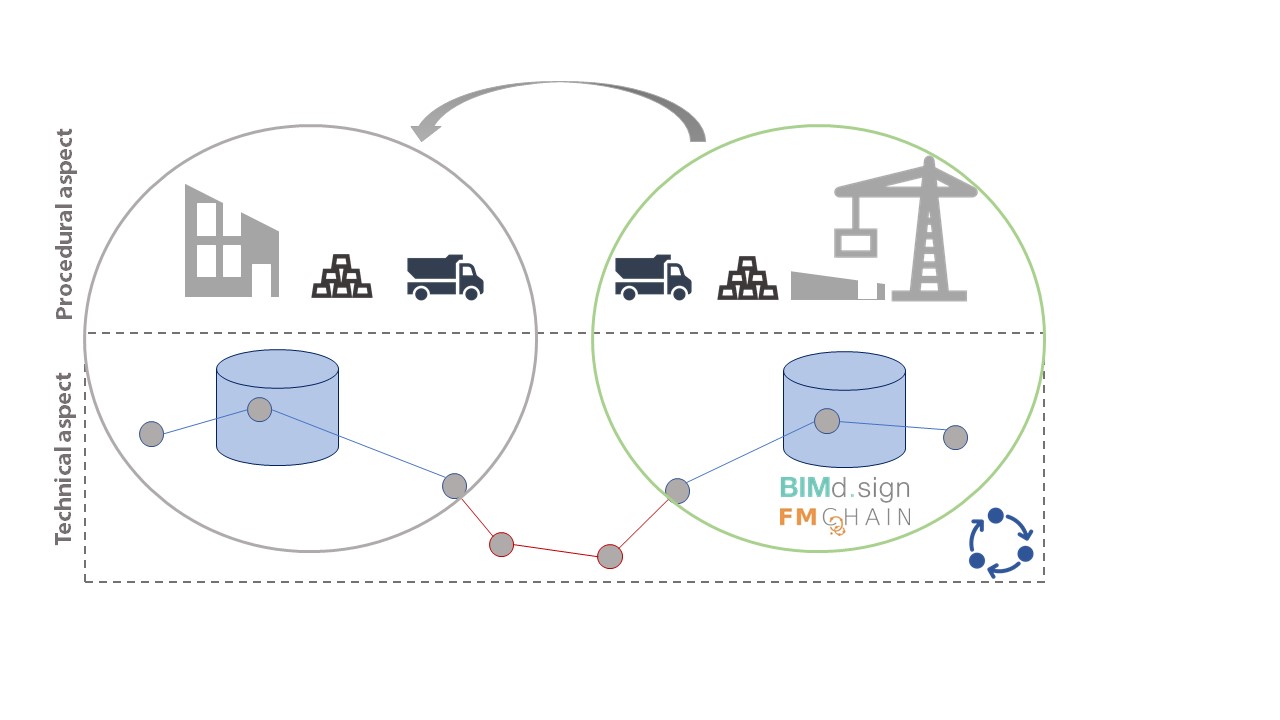DiCYCLE - Reconsidering digital deconstruction, reuse and recycle processes using BIM and Blockchain
Short Description
Starting point / motivation
The architecture, engineering and construction (AEC) industry is facing a number of challenges including the slow application of innovative technologies and digitalization. For the realization of digital technologies and methods in the building life cycle (LC), it is necessary to capture processes and workflows in planning, construction, operation, as well as renovation and deconstruction (End-of-Life [E-o-L]) and to adapt those for the implementation of digital technologies.
Currently available software tools do not correspond to the practices and workflows of the end users, since building models, supported by Building Information Modeling (BIM-Models), are mostly used phase-based (in planning, construction and operation) or domain-specific. For a BIM-based End of life phase, processes need to be defined, standardized and set up for digital tools.
Contents and goals
The research project DiCYCLE aims at identifying, analysing and mapping current E-o-L processes in AEC, as well as optimizing these processes for digitalization, using BIM, block chain (BC) and smart contracts (SC).
The goal is to create new business models and enable sustainable digital planning, construction and deconstruction workflows that facilitate the reuse and recycling of building materials and components along the life cycle. Furthermore, identifying relevant stakeholders and defining their activities/roles/responsibilities concerning the development of the underlying BIM-Model for the E-o-L-phase is essential.
Ultimately, the goal is to enable a transparent, recycling-friendly collection and tracking of building materials and building components along the life cycle, thus minimizing and reducing waste materials during renovation, deconstruction and demolition.
Methods
On the one hand, the research project DiCYCLE focuses on BIM-Models that correspond to the actual state of a building ("as-built"), and on the other, on processes and workflows that describe both data changes and the finished construction work.
Therefore, identifying data structures for E-o-L-relevant information and linking this data with BIM is essential. BC-based technologies will enable the tracking and verification of this E-o-L-relevant data. Hence, SC need to be developed to track the reuse and recycling of building materials and components in an integrated digital building model thereby enabling even early E-o-L-Assessments.
A DiCYCLE-framework will be developed as a proof-of-concept (prototyping) that would demonstrate the implementation of BIM, BC and SC in E-o-L. The project thus represents the continuation of the framework developed in the research projects BIMd.sign and FMChain for the implementation of BC and SC in BIM-supported planning (BIMd.sign) and operation (FMChain).
The innovation of the project lies therefore in the integrated perspective of E-o-L data and processes, their coupling with BIM and the verifying / tracking with BC and SC along the life cycle.
Expected results
In DiCYCLE, scenarios for the realization of BC and SC of the different business models will be tested and evaluated with test use cases. The relevant data for the BIM and SC-supported E-o-L processes (e.g., key performance indicators) will be coupled to the planning phase (BIM "as-planned") in order to enable E-o-L predictions in the early stages of planning.
This way, E-o-L strategies can be derived and can serve as planning and decision-making tools for building owners/investors, strengthening the "circular economy" in the construction industry.
Project Partners
Project management
Senior Scientist Dr. Marijana Sreckovic - Institute of Interdisciplinary Construction Process Management, Department of Integrated Planning and Industrial Building, TU Wien
Project or cooperation partners
- Ao.Univ.Prof. Dipl.-Ing. Dr.techn. Wolfgang Kastner - Institut für Computer Engineering, Automation Systems, TU Wien
- DI Thomas Romm - Architekt DI Thomas Romm ZT
- Peter Heinrich - Kranner GmbH
- Peter Kneidinger - materialnomaden GmbH
Contact Address
TU Vienna - Institute of Interdisciplinary Construction Process Management
Department of Integrated Planning and Industrial Building
Senior Scientist Dr. Marijana Sreckovic
Karlsplatz 13/234-02
A-1040 Wien
Tel: +43 (1) 58801-21525
E-mail: marijana.sreckovic@tuwien.ac.at
Website: www.industriebau.tuwien.ac.at/
Website Project: www.industriebau.tuwien.ac.at/forschung/forschungsprojekte/dicycle/

